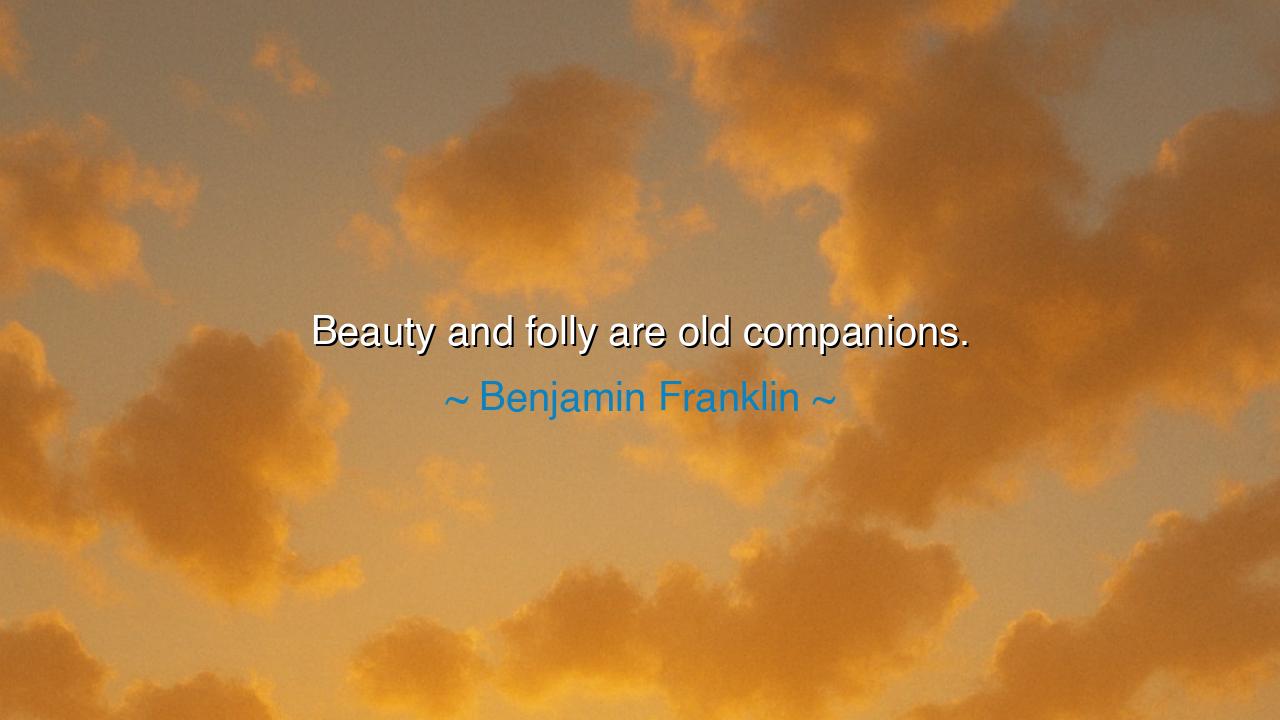
Beauty and folly are old companions.






Host: The room was quiet, the soft flicker of candlelight casting a gentle glow over the space. Jack sat near the window, his fingers resting on the sill, gazing outside at the fading light. Jeeny, across from him, sat in her chair, a cup of tea in her hands, but her attention seemed lost in thought. The stillness between them felt like an invitation to reflect on something deeper, something about human nature and the way we perceive beauty and folly.
Host: Benjamin Franklin’s words filled the room: “Beauty and folly are old companions.” The simplicity and wisdom of the statement, combined with its reflection on how beauty and folly often go hand in hand, seemed to touch on something profound about the complexities of human experience. Jack, who often approached things from a more practical point of view, was the first to speak.
Jack: His voice was thoughtful, almost reflective: “I love this quote. It’s a reminder that beauty, in all its forms, doesn’t exist in isolation. It’s often intertwined with folly, with our mistakes, our imperfections. Sometimes, the things we find beautiful aren’t always the wisest or most rational choices. It’s as if Franklin is saying that human nature isn’t just about making good decisions—it’s about being drawn to what is beautiful, even when it might be foolish.”
Jeeny: She nodded, her voice gentle, but filled with insight: “Exactly. Beauty has this incredible power to draw us in, to captivate us, but it’s not always connected to reason or practicality. We’re often blinded by it, whether it’s the beauty of an idea, a person, or even a moment. Folly, in that sense, is the unintended consequence of being captivated by beauty—sometimes we let ourselves make choices based on what we want or what feels right in the moment, even if it’s not the best decision in the long run.”
Host: The room seemed to grow a little heavier, as though Franklin’s words had opened up a deeper reflection on the complexity of human desires. Jack, who often focused on making logical decisions, seemed to soften his approach, reflecting on how our attraction to beauty isn’t always about wisdom, but about human emotion and impulse.
Jack: His voice was softer, almost revelatory, as he continued: “Maybe that’s what makes us human—the fact that we’re drawn to beauty, even when we know it might lead us astray. It’s not always about logic or reason. Beauty can be something that stirs us emotionally, that makes us feel alive. And sometimes, that emotional pull leads us to folly, to decisions that aren’t necessarily the wisest. But there’s something powerful about the fact that beauty and folly are inseparable in the human experience.”
Jeeny: Her expression softened, her smile reassuring, as she spoke: “Exactly. There’s a kind of vulnerability in being drawn to beauty. It doesn’t always align with logic or practicality, and that’s part of what makes us human. The truth is, we don’t always act wisely, but our attraction to beauty is part of what makes life rich and full. The key is finding balance—acknowledging that beauty and folly often walk hand in hand, but learning to navigate both in a way that leads us to wisdom rather than regret.”
Host: The room seemed to grow still, as though their conversation had revealed something profound about the nature of beauty, folly, and the choices we make. Jack and Jeeny sat together, understanding that beauty is often not just about aesthetics or wisdom, but about the emotional connection we feel, and that folly, while inevitable at times, doesn’t diminish the value of beauty in our lives.
Jack: His voice, now gentler, seemed to reflect a deeper understanding: “Maybe that’s the lesson here. Beauty isn’t something to fear or avoid just because it might lead to folly. It’s part of life. It’s about embracing it for what it is—powerful and unpredictable—and learning how to appreciate the beauty around us, even if it sometimes leads us astray.”
Jeeny: She nodded, her voice affirmative, filled with peace: “Exactly. Beauty is meant to be experienced, even with its flaws and imperfections. It’s about accepting that beauty and folly are connected, and embracing both as part of our journey. They shape us, teach us, and ultimately make life more meaningful.”
Host: The evening continued, but the world outside seemed distant now. Inside, Jack and Jeeny sat in the realization that beauty and folly are not opposites—they are intertwined, part of the same human experience. It’s through our relationship with both that we learn, grow, and find meaning in the unpredictable journey of life.






AAdministratorAdministrator
Welcome, honored guests. Please leave a comment, we will respond soon